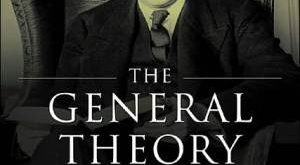Financial crises — no big deal Many say or think that there were problems in the financial system that gave rise to the Great Depression. We’ve looked at that in a systematic way using modern theory. And we found that businesses had all kinds of money to invest, and they didn’t. They increased distributions to owners. Why? The answer is that businesses did not perceive they had profitable investment opportunities. I don’t think financial crises are a big...
Read More »‘Modern’ economics — blah blah blah
‘Modern’ economics — blah blah blah A key part of the solution to the identification problem that Lucas and Sargent (1979) seemed to offer was that mathematical deduction could pin down some parameters in a simultaneous system. But solving the identification problem means feeding facts with truth values that can be assessed, yet math cannot establish the truth value of a fact. Never has. Never will. In practice, what math does is let macro-economists locate...
Read More »Building a science of economics for the real world
Building a science of economics for the real world [embedded content] Following the greatest economic depression since the 1930s, Robert Solow in 2010 gave a prepared statement on “Building a Science of Economics for the Real World” for this hearing in the U. S. Congress. According to Solow modern macroeconomics has not only failed at solving present economic and financial problems, but is “bound” to fail. Building microfounded macromodels on “assuming the...
Read More »Neoliberalism — an oversold ideology
Neoliberalism — an oversold ideology So what’s wrong with the economy? … A 2002 study of United States fiscal policy by the economists Olivier Blanchard and Roberto Perotti found that ‘both increases in taxes and increases in government spending have a strong negative effect on private investment spending.’ They noted that this finding is ‘difficult to reconcile with Keynesian theory.’ Consistent with this, a more recent study of international data by the...
Read More »Tio trasiga teorier om ekonomi
Tio trasiga teorier om ekonomi Under ett par decennier har jag undersökt företagsvärlden och samhällsekonomins många olika uttryck och avarter. Men det har hela tiden varit något som skavt … Tänk om det var något med själva kartan. Själva teorin och modellen … Snabbt blev det uppenbart för mig att många av teorierna och modellerna bakom den dominerande ekonomiska politiken inte alls var så objektiva, vetenskapligt robusta och okontro-versiella som de ofta...
Read More »The most beautiful identity in mathematics
The most beautiful identity in mathematics [embedded content] div{float:left;margin-right:10px;} div.wpmrec2x div.u > div:nth-child(3n){margin-right:0px;} ]]> Advertisements
Read More »It’s time to tax the Wall Street casino!
It’s time to tax the Wall Street casino! Speculators may do no harm as bubbles on a steady stream of enterprise. But the position is serious when enterprise becomes the bubble on a whirlpool of speculation. When the capital development of a country becomes a by-product of the activities of a casino, the job is likely to be ill-done.The measure of success attained by Wall Street, regarded as an institution of which the proper social purpose is to direct new...
Read More »On the fundamental difference between ergodic and non-ergodic processes in economics
On the fundamental difference between ergodic and non-ergodic processes in economics Yours truly has tried to explain the fundamental difference between time averages and ensemble averages repeatedly on this blog. Still people obviously seem to have problems grasping it. Maybe this video will help … [embedded content] div{float:left;margin-right:10px;} div.wpmrec2x div.u > div:nth-child(3n){margin-right:0px;} ]]> Advertisements...
Read More »Non-ergodic stationarity (wonkish)
Let’s say we have a stationary process. That does not guarantee that it is also ergodic. The long-run time average of a single output function of the stationary process may not converge to the expectation of the corresponding variables — and so the long-run time average may not equal the probabilistic (expectational) average. Say we have two coins, where coin A has a probability of 1/2 of coming up heads, and coin B has a probability of 1/4 of coming up heads. We pick either...
Read More »The laws of mathematics and economics
The laws of mathematics and economics Some commentators on this blog — and elsewhere — seem to have problems with yours truly’s critique of the overly debonair attitude with which mathematics is applied to economics. In case you think the critique is some odd outcome of heterodox idiosyncrasy, well, maybe you should think twice … Advertisements
Read More » Lars P. Syll
Lars P. Syll








